By: debbie lynn elias
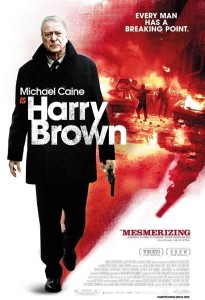 According to Emily Mortimer, not a day goes by that you don’t “turn on the telly” or pick up a newspaper and “there’s always another story day after day of someone being stabbed and this gang violence” taking place not only in London’s East End, but in places all around the word. “The communities that [the gangs] are in don’t offer them [a sense of belonging and family] at all. They are really poverty stricken communities and everybody is living life under really difficult and often terrible circumstances. There’s an abundance of drugs and deprivation and there’s no comfort to be had. There’s no feeling of belonging or that there’s any kind of hope.” According to Sir Michael Caine, who “come[s] from the slums, come[s] from a hard background…a poor family” it’s a failure on the part of “education, family, everything” that “innocent people are turned into criminals. If you treat people like animals, they become animals.” Himself living during his college days at the edge of an estate in England or what we in the States call, “the projects”, director Daniel Barber is personally aware of the escalating violence and degradation of communities not only in East London but the world over, so much so that he himself was compelled to ask searching questions about the “collective responsibility that calls us to act before a whole generation is lost.” And in answering those questions, Barber found HARRY BROWN. A true vigilante with the purest of hearts, harkening back to the days of the Old West and “High Noon”, HARRY BROWN is a hero for the 21st Century.
According to Emily Mortimer, not a day goes by that you don’t “turn on the telly” or pick up a newspaper and “there’s always another story day after day of someone being stabbed and this gang violence” taking place not only in London’s East End, but in places all around the word. “The communities that [the gangs] are in don’t offer them [a sense of belonging and family] at all. They are really poverty stricken communities and everybody is living life under really difficult and often terrible circumstances. There’s an abundance of drugs and deprivation and there’s no comfort to be had. There’s no feeling of belonging or that there’s any kind of hope.” According to Sir Michael Caine, who “come[s] from the slums, come[s] from a hard background…a poor family” it’s a failure on the part of “education, family, everything” that “innocent people are turned into criminals. If you treat people like animals, they become animals.” Himself living during his college days at the edge of an estate in England or what we in the States call, “the projects”, director Daniel Barber is personally aware of the escalating violence and degradation of communities not only in East London but the world over, so much so that he himself was compelled to ask searching questions about the “collective responsibility that calls us to act before a whole generation is lost.” And in answering those questions, Barber found HARRY BROWN. A true vigilante with the purest of hearts, harkening back to the days of the Old West and “High Noon”, HARRY BROWN is a hero for the 21st Century.
Harry Brown is a former Marine and war veteran. Now in his late 70’s, Harry isn’t one to speak about his days in the military, preferring the solace of his small flat and a cup of tea. A quiet man, he lives in the high-rises of Elephant and Castle at Heygate Estate. Appearing to be a once fashionable area, the Estate is now run down and dilapidated, serving as a haven for gangs, misguided youth, drug lords and a breeding ground for senseless violence and crime. Daily murders, videotaped on Flip Cams by the perpetrators, are commonplace. During the day, Harry visits his wife who lies in a vegetative state in a nursing facility. In late afternoons, he joins his only friend, Leonard, at the local pub for a game of chess. Perhaps the only bit of adventure in Harry’s day is the circuitous routes he takes to visit the hospital or meet Leonard, doing his best to avoid a pedestrian underpass at the Estate which is commandeered by the local gangs who spend their time intimidating and attacking young and old alike.
But when Harry’s wife passes away, his life begins to take on a different shape. Getting to the hospital too late thanks to his fear of the gangs and being forced to walk in darkness and the teeming rain, Harry confides his loss and frustration to Leonard. Ironically, Leonard has his own problems and confides in Harry about his issues with the gangs, who have resorted to burning dog feces at his door and in his mailbox. Determined to stand up for himself despite warnings from Harry to just keep quiet and let the police handle it, Leonard is found stabbed to death in the underpass.
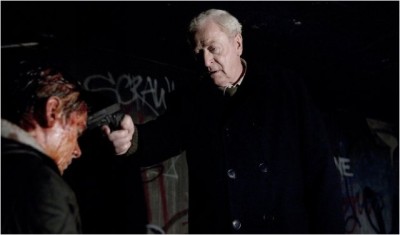
With no family or friends, Harry is who the police come to not only to bring news of Leonard’s death, but to seek answers surrounding his death. Met by the compassionate yet businesslike D.I. Alice Frampton, Harry’s initial faith in the police and their investigative skills are put to the test as crime escalates and murderers continue to run loose. Frustrated and tired of sitting on the sidelines, Harry calls on his long buried past and brings his own brand of vigilante justice to the Estate.
Damn, if Michael Caine still isn’t in kick-ass high gear! As HARRY BROWN, he has as much vim, vigor and military smarts as he exhibited in one of his first films, “Zulu”. Talk about a surprising athletic action performance! I never would have expected to see Caine at this stage of his career running, arming himself with multiple weapons, and even pulling off some nice little action sequences. A real standout scene involves Harry buying guns from some of the local crime lords where he pulls the wool over the eyes of the scumbags, blows out the tv, knifes a guy and then shoots him, chases the other guy into the pot growing greenhouse, blows him away, ignites everything and then carries a girl to safety – WOW!! Going beyond the athleticism and action, Caine is the consummate dramatic actor with a tacitly passionate and emotional performance ruled by conviction of presence perhaps due in large part to his own similarity with HARRY BROWN. Like his character, Caine fought in Korea and grew up on the East End, in a poor neighborhood, actually living around the corner from where HARRY BROWN was filmed. For Caine, HARRY BROWN “reads like a Western. Telling you exactly how it is. We are here because this is all so real. I understood the character absolutely and completely.”
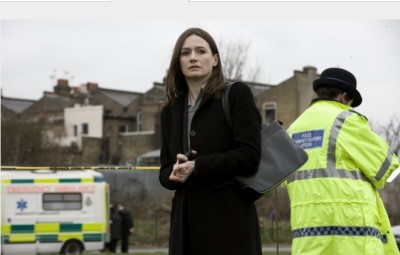
Emily Mortimer was a surprise. Having just seen her showcasing her comedic skills in “City Island”, had I not known it was Emily Mortimer playing D.I. Alice Frampton, I never would have suspected it to be her. These two performances alone speak volumes as to her ability and talent as an actress. As Alice Frampton, she exudes a very timid mousey attitude hidden by a thin veneer of false confidence; never dealing from strength to weakness, she pushed Frampton forward no matter no matter what hand she was dealt despite her fear and trepidation. Mortimer brought a real humanity to the character. For Mortimer, taking this role was a no brainer. “I was drawn to it. It was different from stuff that I had done before. Then, of course, it was impossible to turn down an opportunity of acting with Michael Caine. Who wouldn’t want to do that! And the film itself, I thought it was really interesting. I was particularly impressed by Daniel Barber, the director, when I met him and talked to him about it after reading the script. I thought the script was really gripping and interesting. [Daniel Barber] used the western as a model for the way that he approached this movie. I knew from talking to him he had a sort of auteur take on the whole thing and that he was going to elevate it out of the tv drama and would raise it, hopefully, to something that felt more epic and strange and fatalistic and kind of bad ass.” Intent on rooting D.I. Frampton in reality, Mortimer worked with the highest ranking female D.I. in London, who just happened to be involved in an investigation similar to that in the film. This allowed her to view interviews and techniques and incorporate them into Alice Frampton. “ These young gang members, they close ranks and that whole thing of ‘no comment, no comment, no comment’, that whole thing is taken completely from the reality of what goes on. That’s what they’ve been taught to say and they say it again and again and again. As a police detective investigating the crime, there is a ticking clock situation. You can only pull them in for a certain amount of hours before you have to charge them with something. It’s a really delicate sort of process and these interviews are so fascinating. There are real psychological games that get played out in those rooms.”
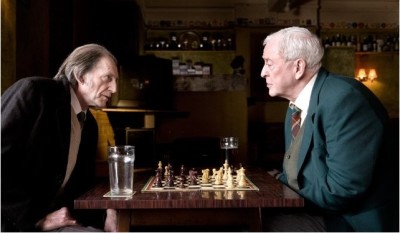
Key to the story line are the gang members and for director Barber, authenticity was key. Auditioning literally hundreds of kids from the Estate area, according to Mortimer, “a lot of the kids that were in the movie as extras, and even the kids that were the principal characters, the gang kids, come from that world. This isn’t unfamiliar territory to them and a lot of them had had experiences that weren’t completely dissimilar from the people they were playing in the movie.”
Artfully crafted, even Caine was impressed by the script, wondering if writer Gary Young “had been listening to a couple of my conversations. It’s that old thing: what’s gone wrong with the young? And the problem now is, the older guys like me, say, ‘Oh the youngsters today, what’s gone wrong? They all turned out to be right but this next generation isn’t going to be. They have armed themselves and there are too many drugs.” From opening to ending I was caught totally off-guard. Initially, everything was unexpected. However, once there was the one comment about HARRY BROWN being a former Marine (Once a Marine, always a Marine), I suspected there would be action in some form, although I was unprepared for the skill with which the story was crafted and Brown’s stealthy, militarily precise vigilante attacks executed. But then going to an entirely different plane, we get a slight comedic edge with Brown relating little war anecdotes to a dying criminal. Actually very very funny. I don’t think anyone but Caine could have pulled off the flat storytelling with a raised eyebrow and then pull the trigger yet again. BRILLIANT! The emotional complexity of Harry Brown himself is so beautifully written and brilliantly executed by Caine. The quiet subtleties and nuances lending to a gentility about the man, yet the vitality and warrior lurking beneath are a marvel to watch unfold. And HARRY BROWN isn’t the only superbly written character. Each is as meticulously created as the other, with character traits and complexities rooted in confidence and self-assuredness setting the stage for the penultimate shootout at the O.K. Corral.
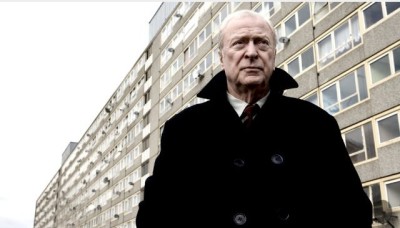
Surprising even to Mortimer was the level of violence portrayed in the film, starting with a double murder videoed on a Flip Cam. Barber “ talked about how he was going to shoot certain scenes with [Mortimer] in them and use the camera from down below looking up… a ‘cowboy shot.’ I was totally blown away by [all the violence] and taken aback. It’s very difficult to watch. I think that’s what’s interesting about the film. It is unseemly what goes on and it’s hard to stomach and it’s hard to accept and what people do to each other. It’s horrifying and I think it’s good that it’s portrayed in all its kind of ugliness. It certainly doesn’t glamorize violence . It’s as difficult and uncomfortable to watch as it should be, I think. But I wasn’t prepared for quite the level of intensity of that.”
So tightly and sharply directed by first timer Daniel Barber, he had my rapt attention through the entire movie. I doubt if I even blinked. The editing is superb – both visually and with sound – going for shock factor with both. Martin Ruhe’s cinematography was edgy and grainy with a tonal palette that created a complete sense of needing a shower just from watching the dregs of society on screen. Extremely powerful visuals. Visceral even. And then to be counterbalanced with a scene where light and color fill a once dirty and dark world and the purity and cleansing of fresh white paint shine like a light from above – very moving.
A man and a film rooted in life, surviving and thriving on heart. A wake-up call for our time. A man for the ages. Move over John McClaine and Martin Riggs! HARRY BROWN is in the house!!
Harry Brown – Sir Michael Caine
D.I. Alice Frampton – Emily Mortimer
Directed by Daniel Barber. Written by Gary Young.












